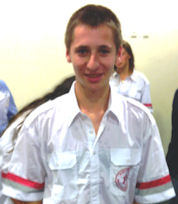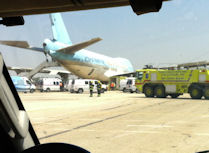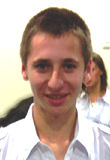I volunteered with Magen David Adom as part of my gap year in Israel in 2011. Initially, I was stationed in Jerusalem, which was extremely busy and chaotic and, after a month, I moved to the Kfar Saba station, which was smaller and less chaotic, but had more of a family atmosphere.
Almost nothing, even completing the intense course, can prepare you for the first time you are on the ambulance charged with the responsibility of caring for a patient.
 It was extremely rewarding to begin feeling more comfortable and to earn more responsibility from the drivers. Having started in Jerusalem doing equipment checklists and checking vital signs, in Kfar Saba I was able to do shifts alone with a driver, and to deal with the patients personally and complete their forms.
It was extremely rewarding to begin feeling more comfortable and to earn more responsibility from the drivers. Having started in Jerusalem doing equipment checklists and checking vital signs, in Kfar Saba I was able to do shifts alone with a driver, and to deal with the patients personally and complete their forms.
Every call affects different people in different ways. For me, calls into the West Bank were real eye-openers. Together with the Palestinian Red Crescent ambulances, we treated and transported Arabs in various car-crashes. Though many of the MDA staff had attended or been personally affected by bombings during the “intifada”, everyone was treated with the same dignity and urgency.
My first and only CPR also occurred in Jerusalem. This was a highly unusual CPR in that it was not an elderly person, but rather a 3 week old baby, who was pale and purple, and had asphyxiation and blood coming from her nose and mouth. I gave breaths with the oxygen pump and protected the baby’s head, without having time to think, in the most frantic ambulance ride I had ever experienced. Although it was only 3 minutes of CPR on the way to the hospital, the image of me kneeling at that baby’s head will never leave me. The CPR continued in the hospital for a few minutes, and after several shocks from the defibrillator, we finally heard “Yesh Dofek” (there is a pulse), and were able to tell the crying mother “Yesh Tikvah” (there is hope). The baby survived.
I seemed, however, to be cursed with baby calls, as this miracle contrasted with a 3-month old I transported in Kfar Saba two weeks later with shortness of breath. Alone in the back, I held the baby as he teetered on the brink of needing CPR. When we made it to the hospital, a social worker instantly approached the mother. The baby, who was known to the hospital and had heart defects, died later that night.
All in all, I attended dozens of car crashes, a few drug-overdose suicide attempts (all survived), and calls to people with almost all medical conditions under the sun. Not every shift was exciting or intense, but I loved spending time with Israelis and laughing at a lot of black humour.
 Some of the other highlights included:
Some of the other highlights included:
• The first time I put the uniform on and went to a shift, and the first time the siren blared in my ambulance – I felt incredibly nervous but also a real sense of purpose.
• A Shabbat night shift in Jerusalem, when it was snowing and no one was on the roads. Incredibly serene.
• The opportunity to go to a school for emergency services demonstrations and pretend to be as cool as the police and firefighters.
• Attending a mass-casualty training and simulation day at the airport, where we got to drive in ambulance convoys across the tarmac.
• Getting a shift on the “natan”, the intensive care ambulance that attends only the highest priority calls.
• Learning better Hebrew and generally getting to meet some pretty incredible and hard-working Israelis.
I absolutely loved my experience with MDA and would highly recommend it to anyone thinking of volunteering in Israel. The organization and their work is incredible.
 Max Kausman
Max Kausman Max Kausman
Max Kausman